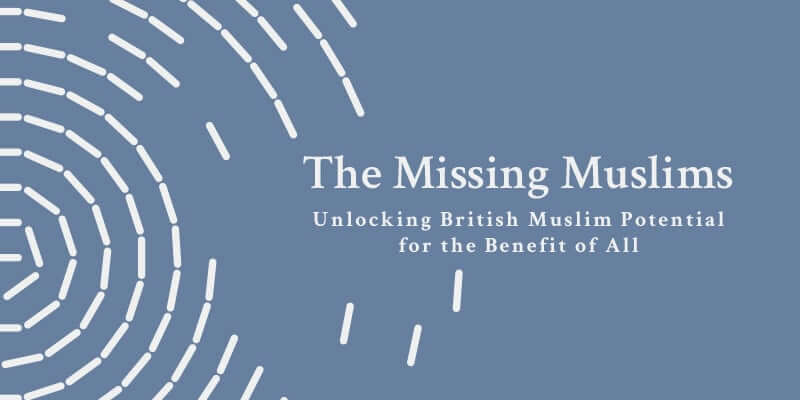Muslims must challenge “extremism” assumptions and continue to contribute on their own terms


An [independent report](http://www.citizensuk.org/missingmuslims) chaired by Conservative MP Dominic Grieve has just been released. Commissioners spent over 500 hours listening to testimonies of Muslims and non-Muslims alike in an attempt to “unlock British Muslim potential for the good of all” – a well-meaning report with some valuable recommendations._
However there is a major hiccup. In some respects, the report reinforces some of the assumptions and prejudices it seeks to challenge.
Talking about Muslims in society is all about extremism
You need not to read further than the second paragraph of Dominic Grieve’s foreword to find the first reference to the “murderer violence in London and Manchester, justified by their perpetrators in the name of religious belief”. This is the frame that seems to have guided much of the report.
While the report was designed to strengthen dialogue across all section of the British society in order to improve Muslim participation in public life, it becomes quite clear that this dialogue and participation are largely about one thing: the “T word”.
As the report states: “the Commission’s overriding concern is that the country needs an effective way of tackling extremism and radicalisation”.
Unfortunately, discussions around or with Muslims seem to always be centred around this. Even when important topics are addressed such as discrimination, lack of opportunities or poverty, it is with ‘extremism’ in mind.
This was clearly illustrated in the media coverage of the report. For example, the Evening Standard published an article titled: “Employers must hire more Muslims to combat radicalism”.
PREVENT has failed not just because Muslims don’t trust the program but because it’s flawed!
When issues of security are discussed, it doesn’t seem that the feedback of Muslims is taken for what it is.
The consensus across the board is that the PREVENT program is “inherently flawed” and “could even end up promoting extremism” as put by the UN Special Rapporteur on rights to freedom of peaceful assembly and of association. Yet, the report finds that “the statutory duty”, introduced in 2015 compelling public sector workers to undergo PREVENT training, “in principle, is sensible”; and there is essentially, only a problem of training and definition.
While countless civil society actors have rejected the program and repeatedly called for it to be scrapped, the report only suggests a review to “provide constructive suggestions on how PREVENT could be refined”.
According to the Commission, David Anderson QC (the former independent reviewer of terrorism legislation) is in favour of an even more limited review, focusing only on the Prevent duty in schools.
Therefore, it transpires that such review would not question the framework in anyway, but would rather focus on cosmetic changes to potentially extend the program.
What would the role of Muslims be in all that?
While the report recognises the failings of PREVENT, it seems to see the solution in requiring the Muslim community to police itself by counter-signing and fronting counter-terrorism measures.
In contrary to the assumptions in the report, PREVENT is not a failed policy because it lacks trust from the Muslim community only. It is a failed policy because it is fundamentally flawed.
Furthermore, the remark that “there is a need for debate within Muslim communities about what are, and are not, acceptable views for the Muslim ‘mainstream’” is quite shockingly condescending.
Which community, other than Muslims, is expected to come up with a list of beliefs which would determine who ‘the good guys’ and ‘the bad guys’ are, beyond the requirements of the law?
Unfortunately this is a recurrent theme within the report.
Engagement requires respect and good faith
There is a great appetite among Muslims to be engaged. Likewise, for policy-makers, there is a realisation that Muslims are a part of the society that cannot be ignored.
But, as a minority, engagement should not be the end game and must have pre-conditions: respect and a genuine willingness to make meaningful changes on the part of the interlocutor, are among them.
If our only entry point to the public discussion is through the lens of securitisation and our role is simply to get the buy-in of the community for an already pre-determined agenda, then there is very little respect or good faith in these “discussions”.
In addition, there perhaps is an undue prominence given to “political participation” while neglecting the value of practical and direct contribution and involvement in public life.
British Muslims are among the most economically deprived in the country, yet, they are also those who give most to charity, ahead of other more privileged groups. According to the Charity Commission, Muslims donated over £100 million during the month of Ramadan alone. That equals a staggering £38 a second during the month.
The report notes that when Muslims participate in public life, “they become subject to a much greater degree of adverse scrutiny, or to allegations about their motivation, than would be considered normal or acceptable for their non-Muslim counterparts”.
While this rings true with many Muslims, we must on the other hand highlight that they have found great appreciation from their neighbours who, free from political agenda, have witnessed first-hand their involvement in the everyday life of the community.
“If it wasn’t for all these young Muslim boys, helping us, coming from mosques, more people would be dead!”, said a survivor of the Grenfell tower in an emotional plea which went viral.
Another local said: ‘I’ve seen no central government response, no local government response – big up the Muslim response, it’s epic, on an unimaginable scale.’
From these perspectives, Muslims have made, and continue to make outstanding contributions to the society and communities they live in.
Download Files








